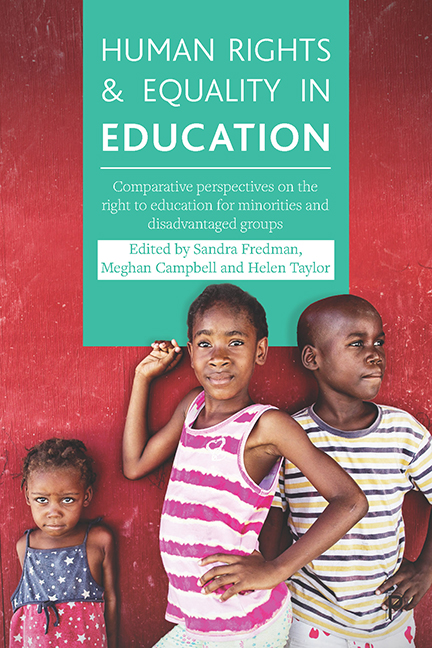 Human Rights and Equality in Education
Human Rights and Equality in Education Book contents
- Frontmatter
- Contents
- Notes on contributors
- Foreword
- Human rights and equality in education: Introduction
- Part I The role of public and private actors in education
- Part II Balancing the right to freedom of religion and culture and the right to education
- Part III Gender equality in education: moving beyond access to primary education
- Part IV Litigating for quality and equality in education
- Index
Foreword
Published online by Cambridge University Press: 19 April 2022
- Frontmatter
- Contents
- Notes on contributors
- Foreword
- Human rights and equality in education: Introduction
- Part I The role of public and private actors in education
- Part II Balancing the right to freedom of religion and culture and the right to education
- Part III Gender equality in education: moving beyond access to primary education
- Part IV Litigating for quality and equality in education
- Index
Summary
The realisation of the right of education is beset with enormous challenges today. Growing inequalities all over the world have their repercussions on the education system, resulting in increasing disparities in the accessibility and quality of education. The universality of the right to education is crippled by the exclusion and marginalisation that undermines educational opportunities for minorities, indigenous peoples, refugees, immigrants, the disabled, nomads, children from poor families, and other vulnerable sections of society. Girls are victims of discriminatory practices in education across many parts of the world, in spite of their equal right to education. Poverty, which is an affront to human dignity and a violation of human rights, is the biggest obstacle to realising the right to education. All those who are victims of poverty in the world today need education to break vicious cycles of disadvantage and disempowerment. The principles of social justice and equity which are at the core of the global mission of the United Nations to promote peace, development and human dignity, should guide our efforts to overcome these challenges in education.
All of these educational deprivations denote a lack of full compliance by states with their international obligations for the provision of free, basic education for all. Moreover, education as a public function of states is being eroded on account of unbridled privatisation. Private providers have been making inroads into education at all levels. The disparities in education have been exacerbated by privatisation owing to scant regulation by public authorities. Sprawling low-fee private schools operate in many developing countries, often showing disregard for the basic norms and principles of the right to education but seldom being held to account. Fast-growing private education institutions are also becoming predominant at the tertiary level. Funded and managed by individual proprietors or enterprises, privatisation is driven by business interests in education, or ‘edu-business’, which is detrimental to education as a public good. Governments, rather than acting against these trends, seem to be abdicating their responsibility to realise the right to education by disinvesting in education as a public good and, in some cases, even actively supporting privatisation.
These trends call for serious reflection as they erode the legal and moral foundations of the right to education as established by international human rights instruments.
- Type
- Chapter
- Information
- Human Rights and Equality in EducationComparative Perspectives on the Right to Education for Minorities and Disadvantaged Groups, pp. ix - xiiPublisher: Bristol University PressPrint publication year: 2018


